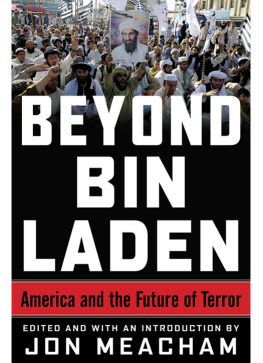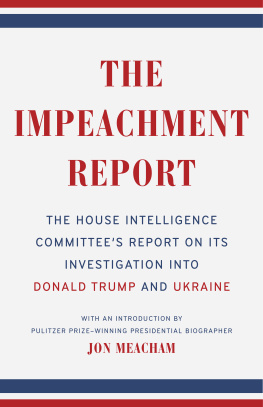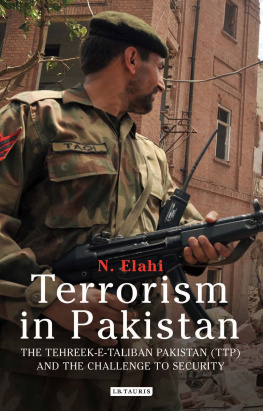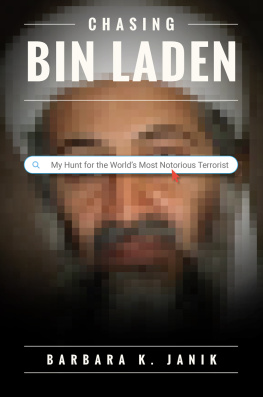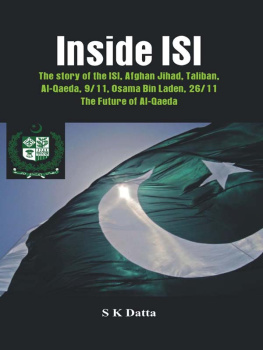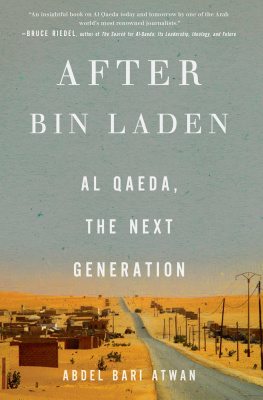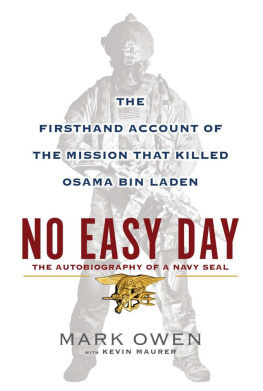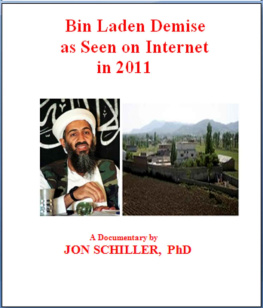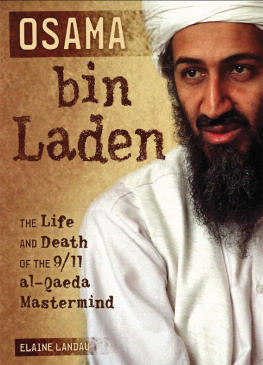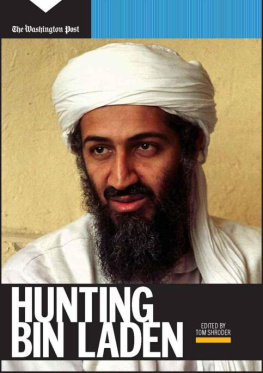Beyond Bin Laden
America and the Future of Terror
Edited by Jon Meacham
Random House New York
Beyond Bin Laden: America and the Future of Terror
A Random House, Inc. eBook Original
"The World After Bin Laden" by Jon Meacham, copyright 2011 by Jon Meacham
"How Al Qaeda Lost the Arabs" by Andrew Exum, copyright 2011 by Andrew Exum
"The AfPak Opportunity Now at Hand" by Bing West, copyright 2011 by Francis J. West, Jr.
"Islamabad, Washington, and the Long Road Ahead" by Daniel Markey, copyright 2011 by Daniel Markey
"Rethinking Afghanistan" by Richard N. Haass, copyright 2011 by Richard N. Haass
"The Trouble with Assassination" by Evan Thomas, copyright 2011 by Evan Thomas
"Justice Finally Has Its Day" by Karen Hughes, copyright 2011 by Karen Hughes
"The New Twilight Struggle" by James A. Baker III, copyright 2011 by James A. Baker III
All rights reserved.
Published in the United States by Random House, an imprint of The Random House Publishing Group, a division of Random House, Inc., New York.
Random House and colophon are registered trademarks of Random House, Inc.
eBook ISBN 978-0-679-64449-1
www.atrandom.com
Contents
The World After Bin Laden
Jon Meacham
To begin at the beginning: It was a good day for flying, that bright blue early autumn morning a decade ago. American Airlines Flight 11, nonstop from Boston to Los Angeles, took off at 7:59 a.m. Eastern time. A passenger named Mohamed Atta was in business class, in seat 8D. Within fifteen minutes, the jet had reached twenty-six thousand feet. About sixteen seconds later, Air Traffic Control in Boston issued a routine directive to the pilots to head up to thirty-five thousand feet.
No one replied. Flight 11 had gone dark.
Reports of what happened between 8:14 and 8:46, painstakingly reconstructed by the 9/11 Commission, come from flight attendants who called the ground as the hijacking unfolded. There were stabbings and the spraying of Mace; the taking of the cockpit; and Attas assumption of the controls. As the plane headed toward New York, officials on the ground thought the hijackers might be bound for Kennedy Airport. The rest of the story is in the words of Madeline "Amy" Sweeney, one of the flight attendants still on a phone line: "Something is wrong. We are in a rapid descent we are all over the place." It was about 8:44. "We are flying low. We are flying very, very low. We are flying way too low." A pause, then: "Oh my God we are way too low." American Flight 11 struck the North Tower of the World Trade Center at 8:46:40, and the world changed.
Oh my God we are way too low : Amy Sweeneys words marked the opening chapter of a new era in American life, one in which innocents found themselves transformed into combatants by the fiat of a faraway fanatic and his followers. That fanaticthe rich, elusive embodiment of ancient evil in a new century, the man who made a living hell of Sweeneys final moments on Tuesday, September 11, 2001met his own end on Sunday, May 1, 2011, when American military forces, in a nighttime raid, killed him in a walled compound at the end of a dirt road thirty-five miles from the capital of Pakistan. Osama bin Laden, a killer in his early fifties who seemed somehow ageless, was shot in the head and buried at sea. Amy Sweeney and the roughly three thousand victims of 9/11as well as the victims of Bin Ladens other attacks, from East Africa to Yemenhad been avenged.
Let philosophers debate whether the American operation was the means of justice or of vengeance; such questions are interesting but not, in my view, urgent. Bin Laden declared war on the West, especially on America, and war was what he got. He claimed he was doing so in the name of Allah. The extreme reading of Islam that provided his rhetoric and his ethos, however, was secondary to the more elemental force that drove him: the will to power. He chose this fight. He got it, and now, presumably, he is discovering the extent of the accuracy of his vision of the world beyond this one. I doubt he is finding the bliss of the martyr.
For those of us still among the living, the death of Bin Laden is welcome and long overdue. The failure to capture or kill him sooner flummoxed three presidential administrations, from Clinton to Obama. In retrospect (that wondrous thing), we can see how Bin Laden moved from smaller-scale bombings, especially the 1998 attacks on American embassies in Africa, to what Al Qaeda called the "spectacular" misery of 9/11. From Langley to Tora Bora to a thousand unknown points in between, men and women acting for our collective security have lived and fought and died to disrupt Al Qaeda, struggling in a common cause that was is , come to thatall too easy to put out of mind. This is their hour.
It is fashionable in some foreign-policy circles to minimize Bin Ladens and Al Qaedas significance. The argumentusually put quietly, in private, with a kind of world-wearinessis that terrorism does not represent an existential threat to the United States, and that the wars after 9/11 have vastly distorted our policies and priorities. In sum, this view holds that George W. Bushs post-9/11 vision of the worlda vision which shapes the reality his successor facesis fundamentally misguided. For adherents of this school, it follows that Bin Ladens death is thought of as symbolic and, in a phrase that grew trite on television before the sun rose in the western United States on Monday morning, May 2, as a "morale boost" for the American psyche.
It is, however, more than that. Yes, Al Qaeda is decentralized, and terrorists could strike from nearly anywhere under the banner of some entity about which we know nothing at the moment. As for the boosted psyche, moments of political and communal feeling, both good and bad, come and go. President Obamas poll numbers will rise, and they will fall.
But radical Islamic terrorismand radical Islam itselfmatters. It may not threaten the existence of the United States, but it endangers the existence of those who might be killed by its attacks, and is a force in nuclear nations such as Pakistan that are riven by radicalism. The death of Bin Laden cannot help but have a beneficial effect on our struggle against extremists, even if those extremists are driven to attempt vengeance. It underscores a capacity for persistence in the American charactera character often caricatured by its enemies as too fat and happy and decadent to focus on any one thing for very long.
Of course, to be honest, sustained public attention is not an overly abundant American virtue. That is why an hour like this one is so important. There are moments in the life of a nation, and of the world, which force an examination of familiar assumptions and offer a largely sclerotic political culture an opportunity to adjust course.
Which brings us to this book. The death of Bin Laden is an occasion to assess where we have been and where we are going. Two wars were begun in the shadow of Bin Ladens attacks, one in Afghanistan, the other in Iraq; the former drags on interminably. Our relations with Pakistan are such that the White House did not inform its government before the assault on Bin Ladens compound. The proliferation of weapons of mass destructionnuclear, chemical, biologicalremains disturbing and maddeningly uncontrollable. The events of the Arab Spring give hope; Muammar Gaddafis durability in Libya gives pause.
In the essays that follow, the contributors look ahead, beyond emotion and conventional wisdom, to suggest what the postBin Laden chapter in American life may be like. And it makes sense to think in terms of chapters, not wholly different stories, for what the government christened the Global War on Terror in the wake of 9/11 can never truly end. Even the "long twilight struggle" of the Cold Warthe phrase is John F. Kennedysreached a conclusion with the fall of the Berlin Wall and the breakup of the Soviet Union under George H. W. Bush.
Next page
